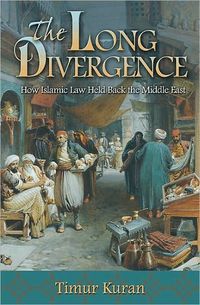

Purchase
How Islamic Law Held Back the Middle East
Princeton University Press
November 2010
On Sale: November 15, 2010
424 pages
ISBN: 0691147566
EAN: 9780691147567
Hardcover
Add to Wish List
Non-Fiction
In the year 1000, the economy of the Middle East was at
least as advanced as that of Europe. But by 1800, the region
had fallen dramatically behind--in living standards,
technology, and economic institutions. In short, the Middle
East had failed to modernize economically as the West surged
ahead. What caused this long divergence? And why does the
Middle East remain drastically underdeveloped compared to
the West? In The Long Divergence, one of the world's leading
experts on Islamic economic institutions and the economy of
the Middle East provides a new answer to these long-debated
questions. Timur Kuran argues that what slowed the economic development
of the Middle East was not colonialism or geography, still
less Muslim attitudes or some incompatibility between Islam
and capitalism. Rather, starting around the tenth century,
Islamic legal institutions, which had benefitted the Middle
Eastern economy in the early centuries of Islam, began to
act as a drag on development by slowing or blocking the
emergence of central features of modern economic
life--including private capital accumulation, corporations,
large-scale production, and impersonal exchange. By the
nineteenth century, modern economic institutions began to be
transplanted to the Middle East, but its economy has not
caught up. And there is no quick fix today. Low trust,
rampant corruption, and weak civil societies--all
characteristic of the region's economies today and all
legacies of its economic history--will take generations to
overcome. The Long Divergence opens up a frank and honest debate on a
crucial issue that even some of the most ardent secularists
in the Muslim world have hesitated to discuss.
Comments
No comments posted.
Registered users may leave comments.
Log in or register now!
| 


 © 2003-2024 off-the-edge.net
all rights reserved Privacy Policy
© 2003-2024 off-the-edge.net
all rights reserved Privacy Policy